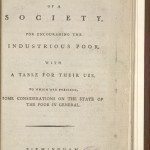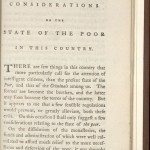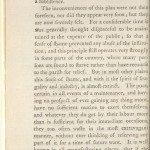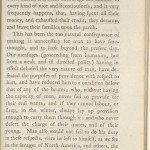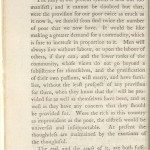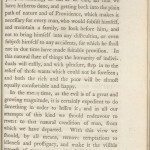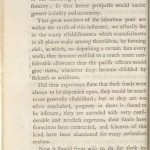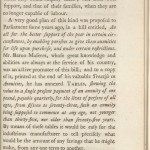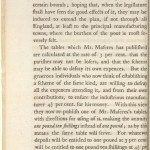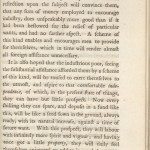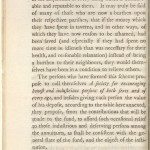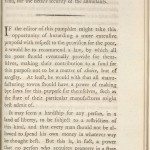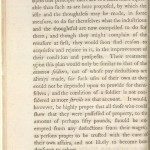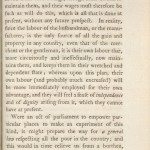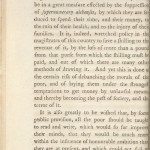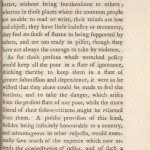An Account of a Society for Encouraging the Industrious Poor
An Account of a Society for Encouraging the Industrious Poor was published in Birmingham in 1787. Its concerns reflect a growing interest in poverty and its associated problems at the end of the 18th century. The terms “poverty” and “poor” were problematic. At one level they were used to describe a social reality where the labouring classes and economically destitute might require charity, discipline or poor relief via the Poor Law. At another level the terms were linked to attitudes towards the lower classes, their state of mind, behaviour and relationship to the social order. Did poverty increase in the late 18th century? Pamphlets and publications drew attention to a perceived increase in poverty which placed burdens on the parish, the unit of local government which administered poor relief via rates on householders. Commentators at this time rarely showed an understanding of the causes of adult able-bodied poverty. It could be due to structural economic change such as the decline of an industry or alterations in agricultural practice. Alternatively, a downturn in the trade cycle caused by war or fluctuating market demand could throw large numbers of normally employed workers into sudden destitution.
This anonymous pamphlet presents an ideology which sees the poor as a burden and a potential source of criminality and immorality. The author advocates the establishment of an insurance scheme to enable the “industrious poor” to escape from dependency on the parish in times of hardship. Instead they would rely on a saved income with interest accruing when circumstances propel them out of employment. In this way they will be removed from a “culture of dependency” and the nation’s wealth would be preserved.
—————————-
AN ACCOUNT OF A SOCIETY, FOR ENCOURAGING THE INDUSTRIOUS POOR,
WITH A TABLE FOR THEIR USE.
TO WHICH ARE PREFIXED, SOME CONSIDERATIONS ON THE STATE OF
THE POOR IN GENERAL.
BIRMINGHAM
PRINTED BY PEARSON AND ROLLASON.
MDCCLXXXVII
——–
SOME CONSIDERATIONS ON THE STATE OF THE POOR IN THIS COUNTRY
THERE are few things in this country that more particularly call for the attention of intelligent citizens, than the present state of the Poor, and that of the Criminals among us. The former are become the burthen, and the latter may soon become the terror of the country. But it appears to me that a few sensible regulations would prevent, or greatly alleviate, both these evils. On this occasion I shall only suggest a few considerations relating to the state of the poor.
On the dissolution of the monasteries, the funds and administration of which were well calculated to afford much relief to the more necessitous and deserving of the poor, it was thought proper to provide for their maintenance by a tax upon every parish; which made their relief no longer an act of charity but an obligation, giving all the poor, without distinction, a legal claim to a subsistence.
The inconveniences of this plan were not then foreseen, nor did they appear very soon; but they are now severely felt. For a considerable time it was generally thought disgraceful to be maintained at the expence of the public; so that a sense of shame prevented any abuse of the institution; and this principle still operates very strongly in some parts of the country, where many persons are found to starve rather than have recourse to the parish for relief. But in most other places this sense of shame, and with it the spirit of frugality and industry, is almost extinct. The poor, certain in all events of a maintenance, and having no prospect of ever gaining any thing more, have no sufficient motive to exert themselves, and whatever they do get by their labour more than is sufficient for their immediate occasions, they too often waste in the most extravagant manner, without ever thinking of reserving any part of it for a time of future want. It is well known in all manufacturing places, that if the greater part of workmen can earn enough in three or four days to maintain themselves and their families for the week, they will never work any more; or if they do make any extraordinary gain, it is spent in alehouses, where they contract the worst habits, and often encourage one another in every kind of vice and licentiousness; and it very frequently happens, that, having spent all their money, and exhausted their credit, they decamp, and leave their families upon the parish.
This has been the too natural consequence of making it unnecessary for man to have forethought and look beyond the present day. Our measures (proceeding from humanity, but from a weak and ill directed policy) having in effect debased the very nature of man, have defeated the purposes of providence with respect to him, and have reduced him to a condition below that of any of the brutes; who, without having the capacity of man, never fail to provide for their real wants; and if they cannot labour, or sleep in the winter, always lay up provision enough to carry them through it; and who never desert the charge of their mates, and of their young. Man also would not fail to do his duty in these respects, were he left to himself, as we see in the savages of North-America, and others, the most uncivilised of our race. There are no examples among them of men neglecting to do what is really necessary to supply the wants of their families, or of their deserting them, except in such extremes of unavoidable famine, as a found to extinguish all feeling for others.
The folly of our present system is now but too manifest; and it cannot be doubted but that, were the provision for our poor twice as much as it now is, we should soon find twice the number of poor that we now have. It would be like making a greater demand for a commodity, which is sure to increase in proportion to it. Men will always live without labour, or upon the labour of others, if they can; and the lower ranks of the community, whose views do not go beyond a subsistence for themselves, and the gratifications of their own passions, will marry, and have families, without the least prospect of any provision for them, when they know that they will be provided for as well as themselves have been, and as well as they have any concern that they should be provided for. Were the rich in this country as improvident as the poor, the distress would be universal and insupportable. At present the thoughtless are maintained by the exertions of the thoughtful.
The evil, and the cause of it, are both sufficiently obvious; but this is not the case with respect to the remedy. Indeed, the evil is now risen to so great a magnitude, that the wisest among us are staggered when they consider it, and are undetermined which way to proceed. Nothing, however, seems so likely to answer the purpose, as undoing, as fast as we can, all that we have hitherto done, and getting back into the plain path of nature and of Providence, which makes it necessary for every man, who would subsist himself, and maintain a family, to look before him, and not to bring himself into any difficulties, or even subject himself to any accidents, for which he shall not in due time have made suitable provision. In this natural state of things the humanity of individuals will easily, and with pleasure, step in to the relief of those wants which could not be foreseen; and both the rich and the poor will be almost equally comfortable and happy.
In the mean-time, as the evil is of a great and growing magnitude, it is certainly expedient to do something in order to lessen it; and in all our attempts of this kind we should endeavour to revert to that natural condition of man, from which we have departed. With this view we should, by all means, remove temptations to idleness and profligacy, and make it the visible interest of every man to be industrious; holding out to every man a certain prospect of bettering his condition, and that of his family, in proportion to his industry, and enabling him to do more for himself than he knows his parish will ever do for him. For it is very much through despair of doing this, that the generality of our labouring poor are so indifferent about futurity; so that better prospects would excite greater industry and economy.
That great numbers of the laborious poor are within the reach of this influence, we actually see in the many establishments which manufacturers in all places make among themselves, by forming clubs, in which, on depositing a certain sum every week, they become entitled to a much more considerable allowance than the parish officers would give them, whenever they become disabled by sickness or accidents.
Did their experience shew that these funds were always to be depended upon, they would be much more generally established; but as they are too often conducted, property in them is found to be insecure; they are attended with very considerable and needless expences, their funds have sometimes been embezzled, and schemes of this kind have been abandoned for many unforeseen reasons.
Now it would seem wise to do for these industrious poor what they are always attempting, but in vain, to do for themselves, viz. to provide a fund, in which all their savings may be deposited, so that they may be faithfully appropriated, without any diminution, and without any trouble or expence to themselves; to the best purposes for which they could employ them; viz. their own support and that of their families, when they are no longer capable of labour.
A very good plan of this kind was proposed to Parliament some years ago, in a bill entitled, An act for the better support of the poor in certain circumstances, by enabling parishes to give them annuities for life upon purchase, and under certain restrictions.
Mr. Baron. Maseres, whose great knowledge and abilities are always at the service of his country, was an active promoter of this bill; and to a copy of it, printed at the end of his valuable Treatise on Annuities, he has annexed TABLES, shewing the value in a single present payment of an annuity of one pound, payable quarterly, for the lives of persons of all ages, from fifteen to seventy-three, such an annuity being supposed to commence at any age, not younger than thirty-five, nor older than seventy-five years.
By means of these tables it would be easy for the industrious manufacturer to tell precisely what would be the amount of any savings that he might make, from any one terms to another.
Though this bill did not pass into a law (perhaps because it was thought to great a measure to be adopted without more consideration) the scheme appeared highly reasonable to many intelligent persons, and some of them are determined to make a trial of the utility of it, within certain bounds; hoping that, when the legislature shall have seen the good effects of it, they may be induced to extend the plan, if not through all England, at least to the principal manufacturing towns, where the burthen of the poor is most severely felt.
The tables which Mr. Maseres has published are calculated at the rate of 3 per cent. that the parishes may not be losers, and that the scheme may be able to defray its own expences. But the generous individuals who now think of establishing a scheme of the same kind, are willing to defray all the expences attending it, and from their own contributions, to ensure the industrious manufacturer 4 _ per cent. for his money. With this view they now re-publish one of Mr. Maseres’s tables, with directions for using it, making the annuity one pound ten shillings instead of one pound; as by this means the same table will serve. For whatever deposit will be entitled to one pound at 3 per cent. will be entitled to one pound ten shillings at 4 _ per cent. and it was thought unnecessary to compose a new table till some trial had been made of the scheme. It is hoped that other individuals, in different parts of the kingdom, will be induced to follow this example; and it is earnestly wished that they may be able to improve upon it. A little reflection upon the subject will convince them, that any sum of money employed to encourage industry, does unspeakably more good than if it had been bestowed for the relief of particular wants, and had no further aspect. A scheme of this kind enables and encourages men to provide for themselves, which in time will render almost all foreign assistance unnecessary.
It is also hoped that the industrious poor, seeing the substantial assistance afforded them by a scheme of this kind, will be roused to exert themselves to the utmost, and aspire to that comfortable independence, of which, in the present state of things, they can have but little prospect. Now every shilling they can spare, and deposit in a fund like this, will be like a seed sown in the ground, always ready, this its natural increase, against a time of future want. With this prospect, they will labour with infinitely more spirit and vigour; and having once got a little property, they will daily feel themselves animated to add to it; and thus many persons who have not no prospect but of seeing their families starving, and disease creeping upon them through intemperance, will soon find themselves within the reach of an enviable condition in life, and be enabled to vie with their neighbours in the acquisition of every thing which is comfortable and reputable to them. It may be truly said of many of those who are now a burthen upon their respective parishes, that if the money which they have spent in taverns, and in other ways, of which they have now reason to be ashamed, had been saved (and especially if they had spent no more time in idleness than was necessary for their health, and reasonable relaxation) instead of being a burthen to their neighbours, they would themselves have been a condition to relieve others.
The persons who have formed this scheme propose to call themselves A society for encouraging honest and industrious persons of both sexes and of every age, and besides giving each person the value of his deposit, according to the table here annexed, they propose, from the contributions that will be made to the fund, to afford such occasional relief to those industrious and deserving persons among the annuitants, as shall be consistent with the general state of the fund, and the object of the institution.
As this trial will be made in the country, those tables only in Mr. Maseres work (here reduced to one) which were calculated for the country are here printed, and not those for the use of London. The money will be deposited in some public stock, or fund, for the better security of the annuitants.
——————
If the editor of this pamphlet might take this opportunity of hazarding a more extensive proposal with respect to the provision for the poor, it would be to recommend a law, by which all the poor should eventually provide for themselves, making their contribution to a fund for this purpose not to be a matter of choice, but of necessity. At least, he would with that all manufacturing towns should have a power of making bye laws for this purpose for themselves, such as the state of their particular manufactures might best admit of.
It may seem a hardship for any person, in a land of liberty, to be subject to a restriction of this kind, and that every man should not be allowed to spend his own money in whatever way he thought best. But this is, in fact, a power that no person who acquires property in a state of society ever has; and it always is, and must be taken for granted, that every society has a right to apply whatever property is found, or acquired, within itself, to any purposes which the good of the society at large really requires; and upon this principle there are few taxes more equitable than such as are here proposed, by which the idle and the thoughtless may be made, in some measure, to do for themselves what the industrious and the thoughtful are now compelled to do for them; and though they might complain of the measure at first, they would soon find reason to acquiesce and rejoice in it, in the improvement of their condition and prospects. Their treatment upon this plan would only be similar to that of the common soldiers, out of whose pay deductions are always made, for such uses of their own as they could not be depended upon to provide for themselves; and the condition of a soldier is not considered as more servile on that account. It would, however, be highly proper that all those who could shew that they were possessed of property, to the amount of perhaps fifty pound, should be exempted from any deductions from their wages; as persons proper to be trusted with the care of their own affairs, and not likely to become burdensome to others.
If we consider the labouring poor as one great body in the community, it will be found that, upon this plan, they would not, in fact, do more for themselves than they do now, without its producing so great an effect. For whatever might be reserved from their savings, enough must be left to maintain them, and their wages must therefore be such as will do this, which is all that is done at present, without any future prospect. In reality, since the labour of the husbandsman, or the manufacturer, is the only source of all the gain and property in any country, even that of the merchant or the gentleman, it is their own labour that, more circuitously and ineffectually, now maintains them, and keeps them in their wretched and dependent state; whereas upon this plan, their own labour (and probably much encreased) will be more immediately employed for their own advantage, and they will feel a sense of independence and of dignity arising from it, which they cannot have at present.
Were an act of parliament to empower particular places to make an experiment of this kind it might prepare the way for a general law respecting all the poor in the country; and this would in time relieve us from a burthen, which at any rate it will not be possible for us to support much longer. I will also take the liberty to suggest, that it will certainly be wise in any legislature to remove from the poor all temptations to idleness, extravagance, and vice; which in this country would be in a great measure effected by the suppression of supernumerary alehouses, by which they are seduced to spend their time, and their money, to the ruin of their health, and to the injury of their families. It is, indeed, wretched policy in the magistrates of this country to save a shilling to the revenue of it, by the loss of more than a pound from that purse from which the shilling must be paid, and out of which there are many other methods of drawing it. And yet this is done at the certain risk of debauching the morals of the poor, and of laying them under the strongest temptations to get money by unlawful means, and thereby becoming the pest of society, and the terror of it.
It is also greatly to be wished that, by some public provision, all the poor should be taught to read and write, which would so far improve their minds, that they would be much more within the influence of honourable ambition than they are at present, and which could not fail to excite a spirit of industry, and thereby contribute to make them independent. In those parts of this country, in which the lower classes of the people are not wholly illiterate, we always see more of a sense of honour, and of a spirit of industry; and their condition is proportionably better, without being burthensome to others; whereas in those places where the common people are unable to read or write, their minds are low and abject, they have little industry or economy, they feel no sense of shame in being supported by others, and are too ready to pilfer, though they have not always the courage to take by violence.
As for those persons whose wretched policy would keep all the poor in a state of ignorance, thinking thereby to keep them in a state of greater submission and dependence, it were to be wished that they alone could be made to feel the burthen, and to take the danger, which arises from the present state of our poor, while the more liberal of their fellow-citizens might be relieved from them. A public provision of this kind, besides being infinitely honourable to a country, and advantageous in other respects, would eventually save much of the expense which now attends the administration of justice, and of such a police, as the country has, and which daily proves more insufficient for the purpose of general security.
Sources and Further ReadingLloyd, Sarah, “Poverty” and entry on “poor laws” in McCalman, Iain (ed), An Oxford Companion to the Romantic Age: British Culture 1776-1832 (Oxford, 1999), p 114-125, 652-653. There is a guide to further reading on p 125.



